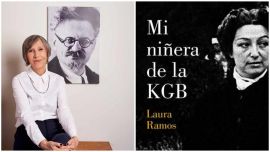The Grandmothers of Plaza de Mayo announced Thursday that they had successfully identified the 131st missing grandchild, the son of a couple of political activists who were kidnapped in 1977 and disappeared.
"We are happy to announce a new restitution of identity," the Grandmothers said in a statement Thursday after the man's DNA tests came back.
"As if the end of the year wanted to fulfill all our wishes," they said in reference to Argentina's recent World Cup victory, "we celebrate the discovery of a new grandchild, number 131."
"The man agreed to undergo the [DNA] study and yesterday [Wednesday] the National Bank of Genetic Data announced the happy news: he is the son of Lucía Nadín and Aldo Quevedo, a couple who were never heard from again," revealed the president of the Abuelas, Estela de Carlotto, at a press conference.
Officials from the NGO said the 44-year-old was "shocked" to learn the results of the DNA tests but that he was "very willing" to learn more once he had seen images of his real parents.
"Now begins a delicate process of getting to know his biological family and the history of his parents," de Carlotto explained, revealing that the person lived in Buenos Aires and had asked for time to take in the news before meeting members of his biological family.
"We are told that he is a sweet, calm person," de Carlotto said. "He [did not react] with refusal or sadness" to discovering his true identity.
But she said he would need time to fully digest the stunning news before being presented to the public.
"He just took it as a reality, a new reality for him," said de Carlotto.
The humanitarian organisation is still searching for "another 300 men and women, whose ages are around 45 years old, who live with their false identities and are among us," said de Carlotto, speaking at a press conference at the Casa por la Identidad at the Espacio Memoria y Derechos Humanos, which stands on the site where the ex-ESMA Navy Mechanics School, a former clandestine detention centre, once operated.
The Abuelas president said that "the suspicion is that the grandchild could have been born in ESMA," thought she did not reveal the individual’s identity.
ESMA was one of the largest torture and extermination centres in Argentina during the era of state terrorism. More than 5,000 political prisoners passed through its doors, of whom close to hundred survived, according to humanitarian NGOs.
Nadín and Quevedo were abducted sometime between September and October 1977 in Buenos Aires. The woman was two to three months pregnant at the time she was kidnapped.
Both were initially held in clandestine centres known as ‘Club Atlético’ and’ El Banco.’ According to survivors' testimonies, Lucía was taken away to give birth, according to sources from the organisation.
"In these 45 years of struggle we have resolved 131 cases [of identity restitution]. We continue to work with the hope that we will find all our grandsons and granddaughters. They could be anywhere in the world," said de Carlotto.
"It is a patient and loving work. Our missing grandsons and granddaughters are men and women with their loves, preferences, desires and families. We grandmothers want to add truth to their story. We await them with love," said de Carlotto.
The Grandmothers of Plaza de Mayo group was founded in 1977 by women trying to find their arrested daughters – and the babies they bore in captivity. The "abuelas" take their name from the Plaza de Mayo square in Buenos Aires where brave women held protests to demand information on the whereabouts of their loved ones.
As the original grandmothers get older, the organisation has since been populated by a younger generation of researchers and councillors.
"It is a constant, silent and loving work, but there are still many missing and time does not stand still. In these years we have had to say goodbye to our dear companions, and many of them were not able to give a well-deserved embrace," said de Carlotto at Thursday’s press conference.
"Our grandsons and granddaughters are already around 45 years old. We grandmothers tell them that we want to add truth to their stories and we await them with love. We call on society to join in, to know that any piece of information is important. Don't keep the information to yourselves, break the silence,” she urged.
The rights body holds regular public meetings in the hopes of reaching people who may have questions about who they are – questions that can be difficult to confront – and convincing them to come forward. Those who successfully go through a verification process can have their stolen identities "restituted."
But it is an increasingly difficult endeavour. As time goes on, those who think they may be the children of disappeared women are ever less likely to come forward.
As many as 500 children were taken from their imprisoned mothers, most of whom then disappeared under the country's brutal 1976-1983 military rule.
Most of the children were gifted to people close to the dictatorship, with the military junta keen to have them raised as regime loyalists.
Only 131 have so far been found, and the search for the others – now adults in their 40s and 50s – continues.
This is the first restitution since June 2019, due in large part to the coronavirus pandemic putting the brakes on research and interviews with potential victims.
Six of the original grandmothers died during the pandemic.
Rights groups say some 30,000 people died or disappeared under Argentina's military dictatorship.
– TIMES/AFP


























Comments